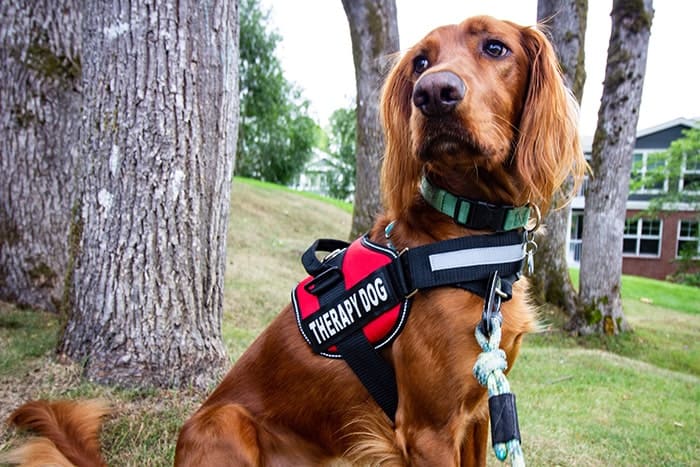It’s no secret that therapy dogs can be trained to do a wide variety of tasks from seeing-eye work, epilepsy detection, search-and-rescue, and even helping a person navigate their surroundings more safely.
Therapy dogs can even be trained as emotional support dogs and help their owners get through debilitating anxiety that would otherwise inhibit their ability to perform ADLs (activities of daily living).
While therapy dogs are often associated with jobs like seeing-eye work or epilepsy detection, they can also be trained to assist senior citizens with daily tasks, such as turning lights on and off, opening refrigerators, retrieving dropped items, and other things that may be difficult for the elderly owner to do.
How do therapy dogs differ from pets?
- They go through extensive training and must pass a certification. They don’t just attend typical puppy kindergarten classes where they learn basic commands and house training. They go through rigorous testing and training to ensure they’re up for the challenge.
- They’re acclimated to conditions that other dogs may never experience. They’re introduced early to wheelchairs, walkers, motorized beds, crutches, doctor’s offices, grocery stores, and much more. This is so they don’t lose their cool in new situations with their future owner.
- They’re working. While it may be completely acceptable to lean down and give a dog at a dog park a scratch behind the ear, it’s really important not to interfere with a dog wearing a therapy vest. They need to remain focused on their job and their owner.
Additional Benefits of Therapy Dogs for Seniors
In addition to life-saving detection, navigation, guidance, and assistance with daily tasks, therapy dogs have a lot more to offer to their aging owners.
- Companionship
- Exercise
- Fresh air
- A sense of purpose
- Reduced stress and anxiety
- Reduced levels of depression
New research even shows a connection between owning a dog and having a healthy heart. Dogs are always happy to greet their owners, always upbeat, and love to stay nearby at all times.
Emotional Support Dogs for Seniors
Not every senior needs a therapy dog, but many pet lovers reach a point in their lives when having a pet is no longer feasible. This can bring great sadness and make seniors feel as though they’re missing out on a key part of their life that brought them great joy in the past.
That’s why groups of people bring trained, desensitized, and friendly animals to assisted living communities, nursing homes, and other care facilities. Just a short amount of time spent in the presence of animals can bring back memories and spark pure joy in the residents. It can absolutely be a therapeutic, mood-lifting experience for everyone involved.
Want to bring pets to a local senior living community?
There are a few organizations across the country that are dedicated to connecting therapy animals with senior citizens that either need a dedicated service dog or are simply craving the affection of a dog again for an afternoon.
Pet Partners, Pets On Wheels, and Therapy Dogs International (TDI) are just a few organizations that train volunteers and pets to provide senior living communities, hospitals, and even schools with the company of pets to improve mental and physical health of each life they touch.
Reach out and get in touch with an association in your area to find out what services they provide to your community!


 Schedule a Tour Today!
Schedule a Tour Today!







